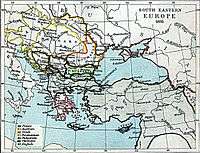Austro–Serbian Alliance of 1881
|
South-eastern Europe in 1881 | |
| Signed | 28 June 1881 |
|---|---|
| Location | Serbia |
| Parties |
|
The Austro–Serbian Alliance of 1881 was a secret political alliance signed on 28 June (Vidovdan) 1881 between Austria-Hungary and the Principality of Serbia. It resulted in the effective association of Serbia with Austria-Hungary and the coming Triple Alliance. The Balkans had been divided into spheres of influence, where Austria took the western part (including Serbia), and Russia the eastern part (including Bulgaria). The treaty came after the railway convention of 6 April 1881 for the construction of the Belgrade–Niš section of the Vienna–Constantinople railway, and the trade treaty of 6 May 1881 which made Austria-Hungary virtually the sole market for agricultural products from Serbia and thereby dominant. Serbia had little choice but to accept Austria as its patron when Russia became a protector of Bulgaria. Austria-Hungary supported the establishment of the Obrenović dynasty and the southward interests of Serbia, in return for Serbian halting of interest in Austro-Hungarian territories (Bosnia and Herzegovina and Sanjak of Novi Pazar), the disallowment of any armed forces to cross its territory, and sharing the use of its facilities in times of war.
See also
References
- Ian D. Armour (2014). Apple of Discord: The "Hungarian Factor" in Austro-Serbian Relations, 1867-1881. Purdue University Press. pp. 311–. ISBN 978-1-55753-683-9.
- Alfred Francis Pribram; Austro-Hungarian Monarchy (1920). The Secret Treaties of Austria-Hungary, 1879-1914: Texts of the treaties and agreements, with translations by Denys P. Myers and J.G. D'Arcy Paul. Harvard University Press. pp. 50–52.
- Jan G. Beaver (1 September 2009). Collision Course: Franz Conrad Von Hötzendorf, Serbia, and the Politics of Preventive War. Lulu.com. pp. 67–. ISBN 978-0-557-09600-8.'
- Robin Okey; Senior Lecturer in History Robin Okey (2 September 2003). Eastern Europe 1740-1985: Feudalism to Communism. Routledge. pp. 134–. ISBN 978-1-134-88687-6.
